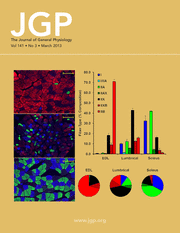
Function
Scope & Guideline
Empowering global collaboration in cell biology and physiology.
Introduction
Aims and Scopes
- Physiological Mechanisms:
The journal focuses on the fundamental physiological mechanisms underlying various biological processes, including cardiovascular, neural, renal, and muscular functions. Research often explores how these mechanisms are influenced by genetic, environmental, and pathological factors. - Molecular and Cellular Physiology:
A significant emphasis is placed on molecular and cellular physiology, investigating how cellular functions and signaling pathways contribute to overall physiological outcomes. This includes studies on ion channels, receptors, and cellular metabolism. - Translational Research:
The journal aims to bridge basic physiological research with clinical implications, highlighting studies that translate findings into potential therapeutic applications for diseases such as diabetes, hypertension, and neurodegenerative disorders. - Systems Physiology:
Research published in 'Function' often employs systems-level approaches to understand how various physiological systems interact, emphasizing integrative physiology that considers the interplay between different organ systems. - Innovative Methodologies:
'Function' encourages the use of cutting-edge techniques, including high-throughput imaging, single-cell analysis, and computational modeling, to investigate physiological questions and enhance experimental rigor.
Trending and Emerging
- Neurophysiology and Behavior:
There is an increasing focus on the relationship between neurophysiology and behavioral outcomes, particularly how neural mechanisms drive physiological responses and adaptations, as seen in studies linking neural signaling to metabolic and cognitive functions. - Exercise Physiology and Adaptation:
Research exploring the physiological adaptations to exercise is gaining traction, particularly in understanding how different forms of physical activity influence systemic health and disease prevention. - Cellular Stress Responses:
Studies investigating cellular responses to stressors, such as hypoxia or metabolic disturbances, are becoming more common. This trend reflects a broader interest in how cells adapt to physiological challenges and the implications for health. - Microbiome and Metabolism:
The interplay between the microbiome and host metabolism is emerging as a significant area of research, with studies examining how gut microbiota influence systemic physiological processes and disease states. - Precision Medicine and Personalized Physiology:
The journal is increasingly publishing research that emphasizes precision medicine approaches, exploring how individualized physiological responses can inform treatment strategies and enhance therapeutic outcomes.
Declining or Waning
- Basic Biochemistry:
Research focused solely on basic biochemical pathways without direct physiological relevance has become less prominent. There is a noticeable trend towards studies that integrate biochemical findings with physiological implications. - Historical Perspectives:
Papers that primarily focus on historical perspectives or critiques of past research methodologies appear to be waning. The journal seems to favor empirical studies with direct experimental outcomes over retrospective analyses. - Single-Factor Studies:
Investigations that examine single factors in isolation, such as specific ion channels or receptors without considering systemic interactions, are less frequently published. The journal's recent emphasis is on integrative studies that account for multiple factors influencing physiological functions.
Similar Journals

Comprehensive Physiology
Elevating Knowledge in Comprehensive PhysiologyComprehensive Physiology is a premier journal published by WILEY, dedicated to the profound exploration of physiological science. With an impact factor that underscores its significance within the field, this journal serves as a pivotal resource for researchers, professionals, and students alike, ensuring access to cutting-edge studies and reviews that span various domains of physiology. It stands proudly in the Q1 category across multiple subfields including Medicine (miscellaneous), Physiology, and Medical Physiology, reflecting its outstanding position within the scientific community. Evaluated within prestigious bibliometric ranks, it boasts an impressive Scopus ranking, placing it in the 12th percentile for medical physiology and 23rd percentile in biochemical, genetic, and molecular physiology. As it converges from 2011 to 2024, Comprehensive Physiology continues to foster a platform for innovative discoveries and collaborative exchanges, thereby contributing significantly to the advancement of medical knowledge and understanding of physiological processes.

JOURNAL OF GENERAL PHYSIOLOGY
Transforming Knowledge in Physiology for Global ImpactJOURNAL OF GENERAL PHYSIOLOGY, published by Rockefeller University Press, is a leading peer-reviewed journal that has been at the forefront of physiological research since its inception in 1918. With an ISSN of 0022-1295 and an E-ISSN of 1540-7748, this esteemed journal maintains an impressive Q1 ranking in the field of Physiology, reflecting its high-quality contributions to both the basic and applied aspects of physiology. Regularly cited in the scientific community, it ranks 70th out of 193 in the category of Biochemistry, Genetics, and Molecular Biology, showcasing its significant impact within academic circles. The journal publishes original research, reviews, and commentaries, aiming to advance the understanding of physiological mechanisms and their implications across various biological systems. Although not Open Access, the journal remains a vital resource for researchers, professionals, and students dedicated to exploring the depths of cardiopulmonary function, neurophysiology, and cellular biochemical processes. The JOURNAL OF GENERAL PHYSIOLOGY continues to serve as a critical platform for disseminating innovative findings and fostering collaboration among scientists globally.

Frontiers in Physiology
Pioneering research at the intersection of physiology and medicine.Frontiers in Physiology, published by FRONTIERS MEDIA SA, is a leading open-access journal that has been at the forefront of physiological research since its inception in 2010. As a reputable publication based in Switzerland, it aims to foster the dissemination of groundbreaking findings across various domains of physiology, engaging a global audience of scholars and practitioners. With a commendable Q2 ranking in the fields of both general physiology and medical physiology for 2023, this journal stands out in its field, achieving a significant Scopus rank of #32/113 in medical physiology and #58/193 in biochemistry, genetics, and molecular biology. Frontiers in Physiology not only commits to maintaining high scholarly standards but also ensures that all its articles are freely accessible, thereby promoting collaborative knowledge exchange. With a clear focus on advancing our understanding of physiological processes, the journal plays a crucial role in the development of innovative approaches to health and disease, making it an essential resource for researchers, professionals, and students alike.

JOURNAL OF CELLULAR AND MOLECULAR MEDICINE
Unlocking the Secrets of Life at the Cellular LevelJournal of Cellular and Molecular Medicine, published by Wiley, stands at the forefront of research excellence in the fields of cell biology and molecular medicine. With an impressive impact factor reflected in its 2023 Q2 category ranking for both Cell Biology and Molecular Medicine, this journal provides a vital platform for researchers and professionals alike, fostering innovative findings and groundbreaking discoveries since its inception in 2000. Maintaining an open access policy since 2012, the journal ensures that knowledge is freely disseminated, promoting collaboration and progress across the scientific community. With robust rankings in the Scopus database, including a position within the top 85th percentile in Molecular Medicine, the journal remains committed to advancing understanding of cellular functions and their implications in health and disease. Researchers, professionals, and students will find a treasure of high-quality articles and reviews that not only catalyze academic dialogue but also contribute significantly to practical applications in the life sciences.

CELLULAR PHYSIOLOGY AND BIOCHEMISTRY
Unleashing Innovations in Physiology and BiochemistryCellular Physiology and Biochemistry is a premier Open Access journal published by the prestigious Cell Physiol Biochem Press GmbH & Co, dedicated to advancing research in the fields of physiology, biochemistry, and molecular biology. Since its inception in 1987 and transitioning to an Open Access model in 2013, the journal has established itself as a vital resource for the dissemination of high-quality research and reviews, showcasing innovative methodologies and groundbreaking findings in cellular processes. With an impressive ranking in the 2023 Scopus category as Q2 in Physiology and a robust percentile of 61, Cellular Physiology and Biochemistry is committed to fostering academic dialogue among researchers, professionals, and students alike. This journal not only provides unrestricted access to its articles, but also promotes the global sharing of knowledge, which is essential for the advancement of our understanding in these vital scientific areas. The journal's editorial team is dedicated to ensuring the highest standards of academic rigor and relevance, making it an indispensable addition to the libraries of those engaged in the life sciences.

Acta Physiologica
Your Gateway to Cutting-Edge Physiological DiscoveriesActa Physiologica is a premier, peer-reviewed journal published by WILEY, dedicated to the dissemination of high-quality research across the field of physiology. With an impressive impact factor reflective of its Q1 category ranking in Physiology for 2023, this journal is a vital resource for researchers, professionals, and students alike, seeking to explore the complexities of biological systems. The journal is indexed with a commendable Scopus rank of #18 out of 193 in its category, placing it within the top 10% of its field, which underscores its influence and citation frequency within the academic community. Acta Physiologica publishes a variety of articles that address fundamental physiological concepts, innovative methodologies, and cross-disciplinary research. With its open access options, the journal ensures that cutting-edge knowledge is readily accessible, fostering an environment of collaboration and advancement in the study of physiology. Spanning from 2006 to 2024, the journal continues to be at the forefront of physiological research and education, encouraging the global sharing of knowledge through its comprehensive content.

JOURNAL OF PHYSIOLOGY AND PHARMACOLOGY
Bridging gaps between theory and application in life sciences.JOURNAL OF PHYSIOLOGY AND PHARMACOLOGY is a distinguished publication presented by the POLISH PHYSIOLOGICAL SOC, dedicated to advancing the fields of physiology and pharmacology. Since its inception in 1991, this journal has maintained a commitment to disseminating vital research findings, contributing to the growing body of knowledge essential for understanding complex biological systems and their interactions with pharmacological agents. With a consistent focus on interdisciplinary studies, the journal holds a Q3 categorization in both Medicine and Pharmacology as well as Physiology for 2023, reflecting its relevance in these crucial fields. Although specific access options are not available, the journal's robust indexing and rankings in Scopus signify its credibility and the high caliber of its contributions, appealing to researchers, professionals, and students alike. Operating from the picturesque Jagiellonian University in Krakow, Poland, this journal not only enriches the academic landscape but also fosters global collaboration and innovation in the life sciences.

JOURNAL OF BIOSCIENCES
Navigating the Landscape of Biosciences Since 1979JOURNAL OF BIOSCIENCES, published by the Indian Academy of Sciences, has established itself as a pioneering platform in the fields of biosciences, encompassing diverse research areas such as agricultural and biological sciences, biochemistry, genetics, molecular biology, and medicine. With an impressive trajectory since its inception in 1979, the journal has achieved notable recognition, securing a Q1 ranking in Agricultural and Biological Sciences and maintaining its place in the top quartiles for Biochemistry and Medicine as of 2023. With Scopus rankings placing it at #32 in General Agricultural and Biological Sciences and #65 in General Biochemistry, Genetics, and Molecular Biology, the journal reaches the 85th and 70th percentiles respectively, reflecting its impact and relevance in current scientific discourse. Although it does not offer open access, the JOURNAL OF BIOSCIENCES remains crucial for researchers, professionals, and students dedicated to advancing knowledge and innovation within the biosciences, providing a vibrant forum for high-quality research and comprehensive reviews.

Neuropeptides
Connecting Researchers to Groundbreaking DiscoveriesNeuropeptides is a prestigious, peer-reviewed journal published by Elsevier, focusing on the critical role of neuropeptides in various biological processes and their implications in cellular and molecular neuroscience, endocrinology, and neurology. With an impact factor reflecting its influence in the field and a diverse audience ranging from researchers to healthcare professionals, the journal serves as an essential platform for the dissemination of groundbreaking research from 1980 to 2024. Adhering to high academic standards, Neuropeptides holds a Q3 ranking in Cellular and Molecular Neuroscience and Endocrine and Autonomic Systems, alongside a solid Q2 ranking in both Endocrinology and Neurology. This positions the journal at the forefront of its disciplines, contributing valuable insights into the understanding of neuropeptide functions in health and disease. By not operating as an Open Access journal, it ensures sustainability in the publishing process while upholding rigorous review standards. Researchers, professionals, and students are encouraged to engage with the findings published in this journal, which plays a vital role in advancing knowledge and fostering collaboration within the neuroscientific community.

JOURNAL OF PHYSIOLOGY-LONDON
Driving Innovation in Physiological ResearchJOURNAL OF PHYSIOLOGY-LONDON, published by WILEY, stands as a prestigious beacon in the fields of Physiology and Sports Science. Established in 1878, this journal has a rich history of disseminating crucial research findings and advancing scientific knowledge, continuing its impact into the present day with an anticipated convergence in 2024. Recognized for its excellence, it ranks in the Q1 category for both Physiology and Sports Science in 2023, cementing its position within the top echelons of academic publications. With a Scopus rank of #26 out of 193 in the Biochemistry, Genetics and Molecular Biology _ Physiology category, the journal boasts an impressive 86th percentile, reflecting its high-quality contributions to the scientific community. Although not open access, its extensive archive and reputation ensure that it remains a vital resource for researchers, professionals, and students eager to stay at the forefront of physiological science. For those looking to deepen their understanding of physiological mechanisms and their applications, the JOURNAL OF PHYSIOLOGY-LONDON is an indispensable resource.